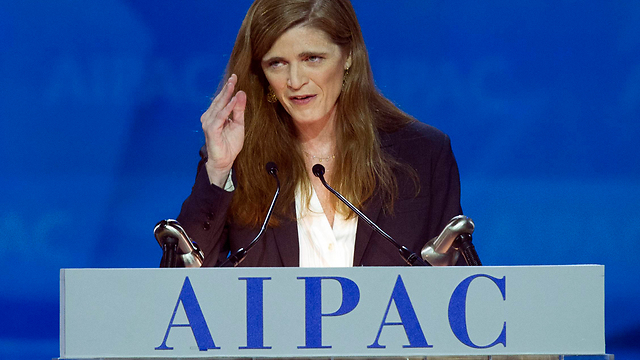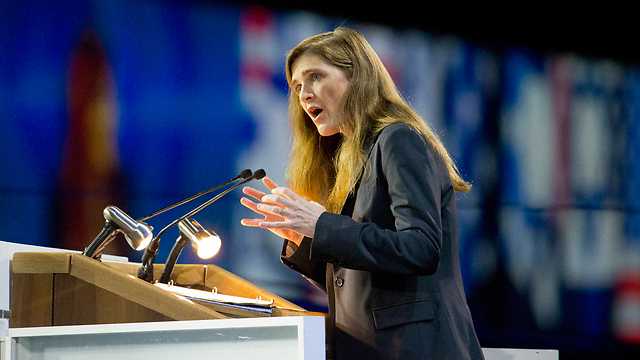
Power at AIPAC
צילום: AP
Power: US-Israel relationship transcends politics
US ambassador to UN tells AIPAC delegates ties with Israel 'should never be politicized' and backs Obama to assure Iran does not develop nuclear weapons.
A top Obama administration official declared Monday that the relationship between the United States and Israel "should never be politicized," while defending President Barack Obama's high-stakes bid for a nuclear deal with Iran.
UN Ambassador Samantha Power's address came amid heightened tensions between the long-time allies, sparked by Israeli Prime Minister Benjamin Netanyahu's plans to address Congress at the invitation of Republican leaders. The White House has criticized the move as a breach of diplomatic protocol.
Power insisted that the strain surrounding the speech obscures the broader security ties between the US and Israel and their shared commitment to preventing Iran from obtaining a nuclear weapon.
"Israel's security and the US-Israel partnership transcend politics and it always will," Power said at the annual policy conference of the American Israel Public Affairs Committee, the largest pro-Israel lobby in the US.
Senior US officials have said the politics surrounding a speech by Netanyahu to the US Congress scheduled for Tuesday threaten to damage the US-Israel relationship, one of the United States' closest alliances.
Netanyahu addressed the gathering Monday morning after Power. "My Congress speech is not intended to show disrespect to Obama or the office that he holds," the prime minister said, in response to criticism of his US visit two weeks before the Israeli elections.
Susan Rice, Obama's national security adviser, was also scheduled to speak Monday night and discuss the ongoing US-led Iranian nuclear negotiations.
Rice has been particularly sharp in her criticism of Netanyahu's plans to address Congress, calling the move "destructive" to the fabric of the US-Israel relationship.
The Israeli leader is deeply suspicious of Obama's efforts to reach a nuclear agreement with Iran, fearing the US and its negotiating partners are prepared to leave Tehran on the cusp of developing a nuclear weapon.
Power said the US prefers a diplomatic route to prevent Iran from building a bomb, but suggested Obama would turn to other tactics if a deal cannot be reached.
"If diplomacy should fail, we know the stakes of a nuclear armed Iran," she said. "We will not let it happen."
US and Israeli officials have reported progress on a deal that would freeze Iran's nuclear program for 10 years, but allow it to slowly ramp up in the later years of an agreement. Netanyahu has vigorously criticized the contours of such an agreement, saying it suggested the US and its partners had "given up" on stopping Iran from being able to get a bomb.
A Netanyahu adviser told reporters traveling with the prime minister to Washington Sunday that he was not coming to the US capital to offend Obama.
"The prime minister is here to warn, in front of any stage possible, the dangers" of the agreement that may be taking shape, the adviser said, speaking anonymously under a policy that bars the official from speaking on the record.
The adviser said Israel was well aware of the details of the emerging nuclear deal and they included Western compromises that were dangerous for Israel. Still, he tried to lower tensions by saying that Israel "does not oppose every deal" and was merely doing its best to warn the US of the risks entailed in the current one.
Secretary of State John Kerry, who is in Switzerland for another round of nuclear negotiations, warned Israel against releasing "selective details" of the negotiations.
"Doing so would make it more difficult to reach the goal that Israel and others say they share," Kerry said.
The US is seeking to secure a framework agreement to curtail Iran's nuclear program in exchange for sanctions relief ahead of a late-March deadline. The US is negotiating alongside Britain, France, Germany, Russia and China.












